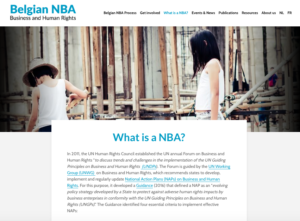The website on the Belgian National Baseline Assessment on business and human rights (NBA) informs stakeholders on the NBA process, timeline and methodology.
The NBA charts the progress made by the Belgian government and companies since the establishment of the first National Action Plan (NAP) on Business and Human Rights in July 2017. The NBA will result in a comprehensive overview of the alignment of Belgium with the United Nations Guiding Principles on Business and Human Rights (UNGPs).
dd
The NBA is executed by a research consortium under the coordination of the Research Institute for Work and Society of the University of Leuven (HIVA-KU Leuven) and the Law and Development Research Group of the University of Antwerp. IPIS addresses the negative impacts of businesses on human rights in conflict areas and high risk areas (CAHRAs).
dhd
IPIS assesses the role of the Belgian state to ensure that companies operating in CAHRAs are not involved in human rights abuses. The team will research the extent to which Belgium’s current practices, legislation, regulations, and enforcement measures address the risk of companies’ involvement in gross human rights abuses. Belgium’s role in sectoral initiatives will also be assessed. The team also analyses the extent to which Belgium’s assistance to companies helps them address the heightened risks of violations.
kjd
Secondly, IPIS assesses the efforts of Belgian companies to comply with the UNGPs in CAHRAs. Companies that operate or are based in Belgium, but have a business relationship with entities operating in CAHRAs, are expected to avoid causing or contributing to adverse human rights impacts. The team will specifically look at the following economic sectors that can have operations in CAHRAs: diamonds and precious metals, metals, textiles, food and electronics. The arms sector will be examined in more detail, identifying binding and non-binding regulatory, and policy frameworks, as well as implementation and enforcement gaps.
gdgf


